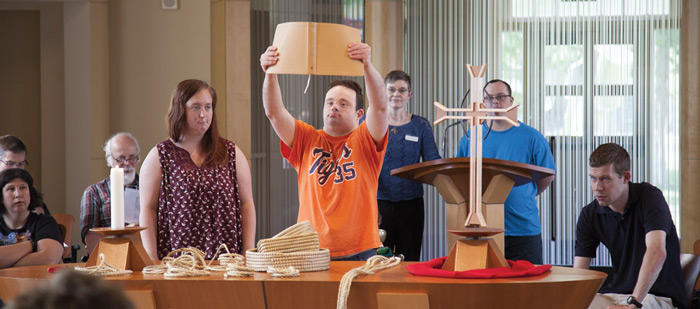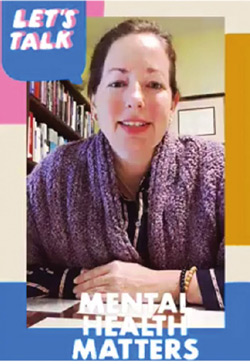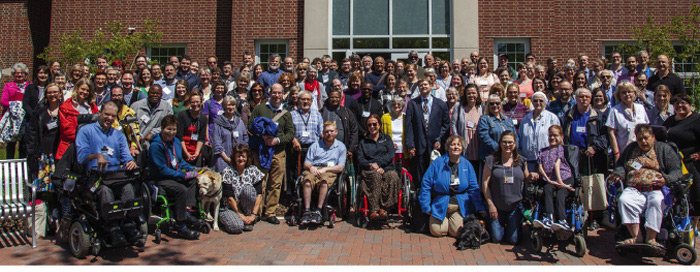
Interfaith worship service at the 2016 Institute on Theology and Disability.
PHOTO COURTESY OF COLLABORATIVE ON FAITH AND DISABILITES
The Rev. Sarah Lund grew up among family members with mental illness, so she’s seen a lot. In 2014, she wrote a short book based on her experiences titled Blessed Are the Crazy: Breaking the Silence about Mental Illness, Family and Church. In 2015 she won the Bob and Joyce Dell Award for Mental Health Education from the United Church of Christ (UCC) Mental Health Network in recognition of her “outstanding leadership in breaking the silence about mental illness in family and in church.”
Until recently, Lund, who is currently senior minister at First Congregational UCC in Indianapolis, didn’t believe that her formal theological education had contributed much to her ability to minister to people with mental or physical disabilities. Her first-hand education from her family was more instructive than her seminary education.
In 2018, she began part-time work as the minister for disabilities and mental health justice for the UCC national office. “I began looking for educational opportunities to further inform my work,” she says, and that’s when she heard about the certificate program in disability ministry program at United Theological Seminary in Dayton, Ohio. The program, which combines weekly online lectures, mentoring, and group discussions with a two-day on-campus seminar each semester, allowed her to study without leaving her pastoral jobs. Considering the statistics, ministering to people who live with a disability is a significant concern for spiritual leaders. In the United States, 20 percent of the population has at least one family member with a diagnosed psychological or physical disability that affects their level of freedom, independence, or quality of life, and in Canada, 16 percent of the population is living with a disability of some type. And while the Americans with Disabilities Act of 1990 improved accommodations and accessibility for people with disabilities and gave them certain civil rights protections, it exempted religious buildings. Some clergy may have felt they too were exempt.
A Vanderbilt University study published in Theological Education in 2014 reported that only 30 seminaries then offered a course focused on disabilities and 75 percent of deans and administrators surveyed at 118 seminaries perceived that their graduates were “not at all” or “only a little” prepared to deal with spiritual and theological questions related to disability. Erik Carter and Naomi Annandale, the authors of the study, wrote: “Relatively little attention has focused on the place of disability within the theological curriculum. We are convinced that the ubiquity of disability calls for much greater attention than is currently provided.”
Not all theological schools are ignoring the complex issues surrounding disability. At least two now have certificate programs in disability studies. United Theological Seminary, where Sarah Lund is studying, launched its program in 2018, and Western Theological Seminary in Holland, Michigan, created its program in 2015.
Western Theological Seminary
The Graduate Certificate in Disability and Ministry at Western incorporates a 24-hour curriculum that can stand alone as a certificate or be applied toward an M.A. or M.Div. degree. Western’s courses are taught in a distance-learning format by national leaders in the field — some with disabilities — and by the seminary’s regular faculty. In 2020, Western will launch a Center for Disability and Ministry and a doctor of ministry program.
Benjamin Conner, professor of practical theology at Western, is one such leader. He has written two books on disability and ministry: Disabling Mission, Enabling Witness: Exploring Missiology Through the Lens of Disability Studies (IVP Academic, 2018), and Amplifying Our Witness: Giving Voice to Adolescents with Developmental Disabilities (Eerdmans, 2012). Conner will help to host the 2020 Institute on Theology and Disability conference at Western (see sidebar).
Conner became interested in disability ministry while writing a dissertation at Princeton Theological Seminary. “I experienced disability in my own family, and that situation brought me into that world of disability advocacy,” he says. “So, I started a ministry with adolescents with intellectual and developmental disabilities. I realized that what I was doing with Christian practices and missiology had a lot to say about disability, and that the experience of disability has something to say about how I understood missiology and Christian practices.”
 |
| Sarah Lund, the minister for disabilities and mental health justice for the United Church of Christ, took to Facebook Live to share a message about World Mental Health Day 2019. The special emphasis that year was suicide prevention. |
The certificate program at Western has had 11 graduates so far— one in its first year, two in its second, and eight in its third year. About 30 students are enrolled. “We have different levels of entry,” Conner says. Forty percent of the program’s participants are M.Div. students, and 50 percent are enrolled only in the certificate program (though some plan to pursue a full master’s degree later). He says the other 10 percent of students include pastors, Young Life staff members, and D.Min. candidates from other seminaries who want to focus on a disability-related project.
United Theological Seminary
United Theological Seminary’s certificate program is in its second year. Kirsty Jones, its director, is completing a Ph.D. at Georgetown University focusing on “disability and the senses” in the Hebrew scriptures. At United, three hybrid courses combine weekly online lectures and mentoring (by Jones and her colleague Zach Holler) with a two-day on-campus intensive each semester. Students are evaluated by short assignments, sermons, research papers, and class presentations. They finish with a thesis and a three-day on-campus intensive called Disability: Theory and Practice. Students must also participate in a disability practicum in their community while completing the program. However, the certificate program does not offer transferable credit and cannot be used toward an M.Div. or M.A. degree.
“United launched the program because we saw a growing, pressing need for church leaders and lay people to be equipped to minister with people with disabilities and their families,” says Jones. She adds that few seminaries are addressing this need.

The 2019 Institute on Theology and Disability was held on the campus of Western Theological Seminary and
Hope College in Holland, Michigan. | PHOTO COURTESY OF COLLABORATIVE ON FAITH AND DISABILITES
Sarah Lund reports that her experience at United has been positive. “The way that Kirsty and Zach teach the classes is very interactive,” she says. “We spend half the time discussing the reading material and the other half discussing our practicum work. My practicum is serving in the UCC’s ministry for disabilities and mental health justice, which involves developing resources for congregations.”
In 2008, the Association of Theological Schools (ATS) adopted a five-page statement on disability and theological education that encourages seminaries to improve their physical accessibility, remove physical barriers, and incorporate the spiritual dimension of disability studies in all areas of their curriculum (Disability and Theological Education). Other ATS disability-related resources are listed here.
How can a seminary get started with a program on disability? Benjamin Conner suggests offering a lectureship or symposium on disability and ministry: “A seminary can inexpensively bring the best scholars with disabilities and those who focus on disability before their faculty and student body.” And in conjunction with lectures, schools can also offer practice-based workshops for local congregations.
People with disabilities: Who are they?
“People with disabilities” is a term referring to a diverse group of people with a wide range of limitations or impairments, including mobility, cognition, hearing, vision, independent living, self-care, and “invisible” disabilities such as learning disabilities. Approximately 20 percent of Americans and 16 percent of Canadians have one or more diagnosed psychological or physical disabilities.
The Americans with Disabilities Act (ADA) of 1990 defines a person with disabilities as:
- A person with a physical or mental impairment that substantially limits one or more major life activities.
- A person with a history or record of such an impairment.
- A person perceived by others as having such an impairment.
The ADA does not specifically name the impairments.
People living with a disability often face cultural isolation and discrimination in education, employment, and societal activities. This isolation often leads to economic inequities.
Institute on Theology and Disability
The Institute on Theology and Disability, which is usually an annual event, was scheduled to be held in May 2020 at Western Theological Seminary. Because of the ongoing COVID-19 pandemic, the 2020 conference has been canceled. Typically the institute includes about 30 workshops and attracts, scholars, clergy, seminarians, disability advocates, and others committed to advancing their ministries in faith communities.
The institute was founded in 2010 by Bill Gaventa when he was on the faculty of the Boggs Center on Developmental Disabilities at Rutgers Medical School. A graduate of Union Theological Seminary, Gaventa is an American Baptist minister whose career includes hospital chaplaincies, teaching, and administration in disability-related ministries.
The past 10 conferences have been held in various locations in Canada and in the United States. Average attendance has ranged from 125 to 175. “Our vision is to foster diverse and authentic interfaith conversations at the intersection of theology and disability,” says Gaventa. While most participants come from Christian denominations, it has also included Muslim and Jewish speakers.
Gaventa describes the conference as a mixture of practical and academic. “It’s a place where people doing academic work can talk with those doing ministry work,” he says. “It gives academics a chance to run stuff by people who are out there doing disability ministry all the time. It gives people who are doing ministry a chance to reflect on the biblical and theological foundations of their work.”
The Institute on Theology and Disability is endorsed by the ATS and the Association of University Centers on Disabilities. More details are available at www.faithanddisability.org.
Questions for theological school leaders
- In what ways can our school improve our welcome and our service to all of our students, whatever their level of ability or disability, to move from being merely “accessible” to also being “inclusive”?
- In what ways are we preparing students to minister to all people — those with varying levels of ability or disability?
- How do our curriculum and our co-curricular programs support ministering to all people?




























